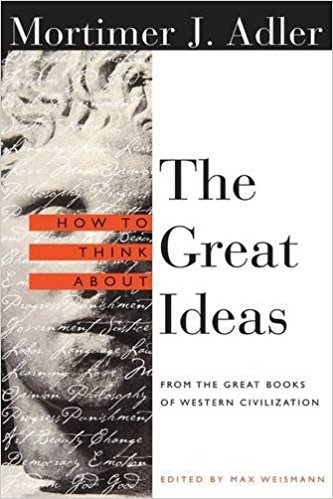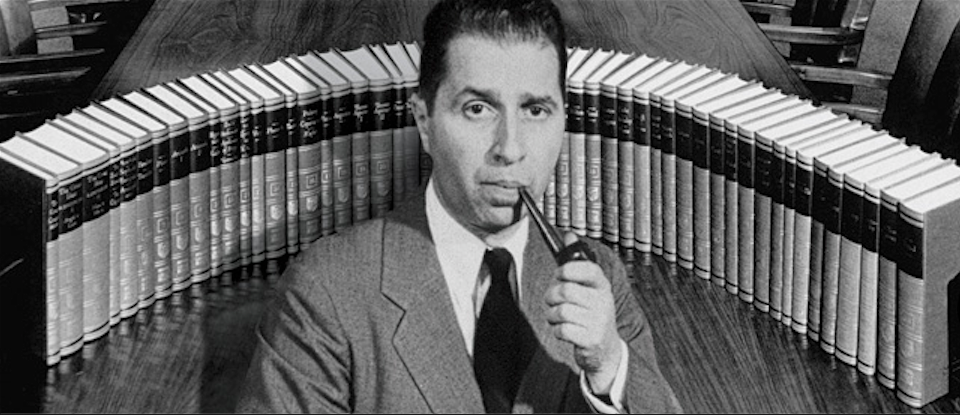So I finally finished this behemoth of a philosophical tome last week.

With notes on almost every page, I could write an essay (or ten) I’ve got more than enough inspiration for writing about 18 essays, inspired How To Think About The Great Ideas by Mortimer Adler. (see a quick brainstormed list at the end of the post).
Being essentially a syntopic overview of the so called, “Great Books” this book covers a lot. Here’s a list (from the book’s forward) on which of the 103 “Great Ideas” are covered –
- Art
- Beauty
- Change
- Democracy
- Education
- Emotion
- Evolution
- God
- Good and Evil
- Government
- Happiness
- Justice
- Labor (Work)
- Law
- Liberty (Freedom)
- Love
- Man
- Opinion
- Progress
- Punishment
- Truth
- War and Peace
Instead of launching into a meandering and broad scale overview of these (which would amount to rewriting the damn book myself), I’ll first give my thought on the literary style of the book as a whole, then outline some topics which I plan on writing essays about in the near future.

To begin, it’s worth taking particular note of the genesis of How to Think About The Great Ideas. The author, Mortimer Adler (left) just about dedicated his whole life in pursuit of understanding “the Great Books of the Western World” which he popularized through his position at Encyclopedia Britannica. Being so enthusiastic about them, the ideas presented within and the Liberal Arts as a whole, he also wrote a lot about education and bringing philosophy into a more public spotlight. In 1953/4 Adler made his televised debut on a show titled The Great Ideas – the book which is almost a straight transcript of. The show took audience letters – which essentially drive the discussion between Adler and his collaborator, Lloyd Luckman through the Great Ideas. As such the book becomes a dialogue between ancient authors and the wider American public, with Adler as the intermediary. The result is a brilliantly readable, psuedo-Socratic dialogue exploring the Great Ideas.
I’d previously read How to Read a Book and How to Speak, How to Listen by Adler and had become accustomed to his half casual, half academic style. I was pleasantly surprised to find that despite the book being a transcript, his manner of speaking is much of the same as his writing. Adler makes a particularly good habit of enumerating his points (which is insanely impressive, when you realize this was all unscripted), making the book as a whole have a structure which persists right through from the level of sentences and paragraphs, to that of chapters and the book itself.
The book essentially comprises of several sets of chapters – each collection of which explores a particular idea, like Art & Beauty or Government & Law at length. Adler endeavours to begin with a clear and understandable definition of each idea/concept at hand before launching into the primary philosophical problem at hand – usually some kind of categorization exercise. At first, I was somewhat puzzled at how big of a deal he continued to make categories such as the different kinds of Work, different kinds of Art, Beauty, Law, etc… but it serves quite well to clarify precisely what the ideas are. For someone living in a predominately postmodern era, however, it takes some getting used to. Some readers might take intellectual offence to the pursuit of rigid categorization, but that’s a whole other blog post.
That’s enough about the book itself. Given that it is essentially a vast philosophical summary, it’s hard to pin down any one stand out chapter or idea (it was all excellent!). So instead, here is a brief list of essay topics, inspired by Adler, which I’ll be exploring in the near future:
(Update (19/11/17): Whilst I do wish to get back into writing, this essay list has been haunting my mind for some time so I struck out the ones I decided not to bother with, and will finish off maybe another two or three)
The Different Breeds of Modern SkepticsMajority Rule in Politics and Science- Dominion & Nature
The Philosophy of EmotionsWhat happened to the “Good Life”?From Free Will to Liberty – Degrees of Freedom- The Failure of Education
Death of Leisure- Appreciating Art as a Mathematics Student
- Is Mathematics a Fine Art?
What would Plato think about (Social) Justice?- Towers of Babel, Networks of Meaning
- Work, Play, Leisure and Wu Wei
The Lost Purpose of Liberal ArtsGovernment: A Monopoly of Authorized ForceTechnology and New Forms of Government- Transhumanism: You Can’t Stop Progress
A Rant on Why Everyone Should Do Philosophy
Time to get writing.
-A

Leave a Reply